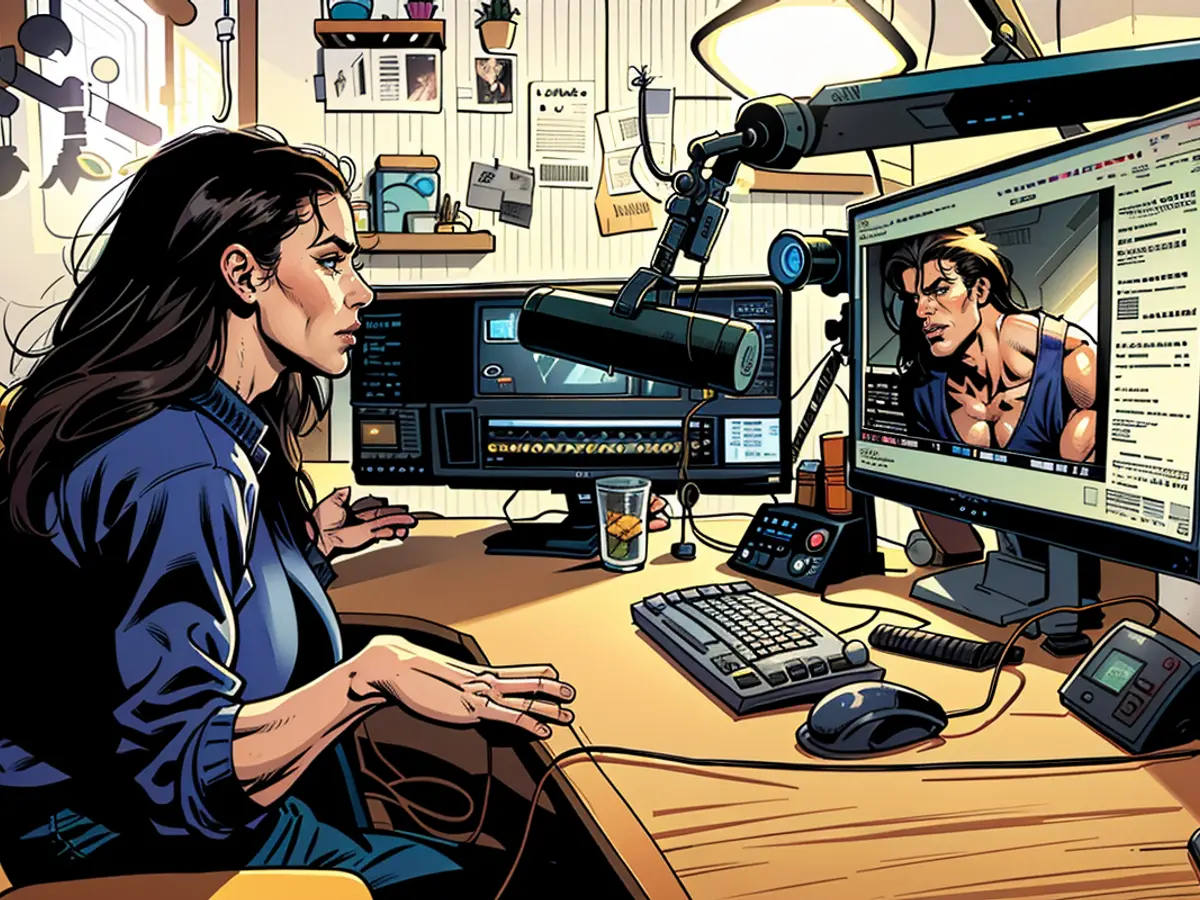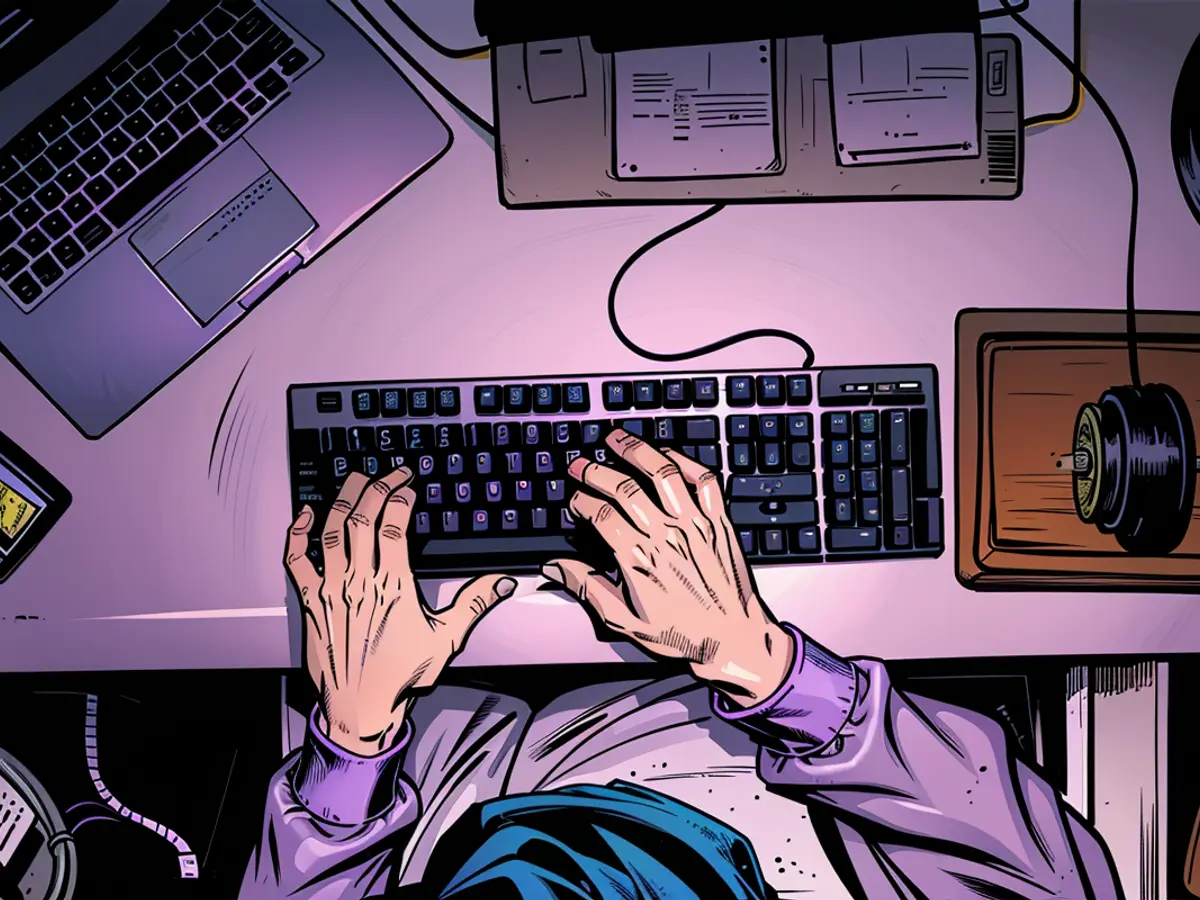- One in three women fears online nudity and threats
Insults, Doxxing, sexual harassment, and revenge porn: New forms of threat are emerging on the internet. Cyberbullying is a growing global problem: 50% of young adults in the EU have experienced online hate according to a representative survey. Half of those aged 18 to 35 have been personally affected.
The consequences are severe: "You're publicly shamed, you feel embarrassed, and of course, it's stressful. It can lead to anxiety and depression," says Josephine Ballon, a lawyer and CEO of HateAid. This human rights organization in the digital realm, along with The Landecker Digital Justice Movement, supports victims and commissioned the representative survey.
Women are particularly withdrawing from social media due to fear of attacks. One in three fears that stolen or fake nude pictures could end up online. The Digital Services Act (DSA), a new EU law, aims to create more security and responsibility online.
For an investigative documentary, RTL reporter Angelique Geray researched so-called exposer forums. These platforms are a hub for digital violence and degrading content. Private photos and information about women are published without their consent, often accompanied by horrifying calls for violence.
The Dark Corners of the Net: Digital Violence
These forums foster a climate of anonymity that emboldens perpetrators. They post photos taken secretly, often in seemingly harmless situations like in the garden or taking out the trash. These images are then manipulated by other users and distorted into obscene content using AI. "We'll see even more cases of digital violence in the future," warns Martin Rettenberger, a criminologist and psychologist. That's because new AI programs are coming onto the market weekly.
The posts in these forums are disturbing and often violent. A typical call to action reads: "Do whatever you want with her. I have her address and would share it."
Angelique Geray posed as a like-minded individual to track down the perpetrators. She found numerous German-language posts detailing how women are observed, photographed, and then exposed online. Perpetrators exploit their trusting relationships to abuse women's trust and invade their privacy. The victims are usually unaware of this abuse.
The Deepfake Trap
Lena Vanille, née Lena Sohnle, is a popular streamer with over 300,000 followers. Her fans regularly watch her online gaming sessions on Twitch. Lena Vanille knows the rules of the net. But one day, she discovers that her face has been used for pornographic deepfakes. "I was told there are deepfakes of me," she tells her community in a trembling voice. "They're on porn sites, with my face edited on. But that's not me." But removing these videos from the net is nearly impossible.
Lena is shocked when she sees one of the videos. Her face moves, her expressions seem real - but the body isn't hers. This technology can transfer any face convincingly onto a stranger's body - with just a simple app. A 2023 study shows that about 96% of all deepfake videos are pornographic and mainly target women. "It's just crazy," says Lena. "Even though I've never produced any sexual content, I suddenly find myself in a porn movie."

The anxiety and shame that Lena feels are hard to put into words. "It feels like a part of my identity has been stolen," she describes her feelings. But instead of retreating, Lena decides to continue fighting for her place online. She won't be silenced and sets an example against this form of digital violence.
Secretly photographed by her own nephew
Nina (name changed), a 37-year-old woman from Thuringia, can hardly believe what she's discovered. Her own nephew has secretly taken photos of her and published them online. "It's disgusting, perverted. I could throw up right now," she says tearfully. The 20-year-old steals her underwear, photographs it with obscene objects, and posts the pictures in expose forums. "I want my hot 37-year-old aunt to be exposed. I want her to be raped," he writes in a post. "I've been watching her for years and taking secret photos."
Despite the shock, Nina has decided not to stay silent and has reported her nephew. "He was never very talkative, more of a loner. But this? This is beyond anything," she says in disbelief. The idea that someone from her own family could betray and humiliate her like this is unbearable.
Thanks to intensive investigations, a search warrant was executed at the nephew's parents' house. The young man, who works as an emergency medical technician, has since sought psychiatric treatment. "The family is destroyed," says Nina. "It's hard to bear that someone I trusted could do something so horrible."
Unsolicited nude photos: "dickpics"
Mareile Höppner, RTL presenter, has been receiving unsolicited "dickpics" for years. A man keeps sending her pictures of his genitals. In an interview, she confronts the perpetrator: "I thought it would be easier to talk to you. But it's actually quite difficult to listen to you," she says, visibly uncomfortable.
The man admits that it excites him when women make fun of his pictures. "My fetish is that the woman makes fun of it and reacts negatively," he explains. "Not negatively in the sense of being disgusted, but that she laughs at me." Mareile makes it clear: "Receiving unsolicited nude photos is not funny. It's annoying and humiliating." Her determination to stand up against this harassment is meant to encourage other victims to do the same.
The stalking neighbor
Sabine (name changed), a woman from North Rhine-Westphalia, is secretly photographed by a neighbor. Reporter Angelique Geray finds pictures of Sabine and her two daughters taken through the window of their terraced house on an online forum. "I really don't know what to say about this. It's shocking and repulsive," Sabine says, having never seen this forum before.

Sabine had already felt harassed by her neighbor for some time, but the extent of these digital invasions was new to her. "He photographed me when I was taking out the trash, when my daughter was getting into the car, even when I was sitting in the garden. I couldn't imagine someone would go that far."
Private moments stolen
Geray shows Sabine the posts in the Exposer forum where the suspected perpetrator, her former neighbor, under the username "Strange_dude" and with a profile picture of his genitals, encourages other users to create deepfakes from the images. "It's indescribable how he stole and displayed our private moments," says Sabine.
Additionally, the perpetrator published the real names of Sabine and her daughters, as well as more photos revealing details about where the women live. "He put our safety at risk," says Sabine.
When the camera team stands in front of the suspected perpetrator's house, he even invites the journalists. Reporter Geray discovers a camera near the window on the upper floor. The neighbor claims ignorance and says: "It's all just a coincidence that I can't explain." The police are investigating.
Doxing: Data on the Internet
What happens in these forums is not only morally reprehensible but also illegal. Collecting and distributing personal data without consent is called doxing, which is illegal in Germany.
Personal data of the victims such as addresses, phone numbers, and even places of work are published. The goal is to harass and intimidate the victim offline. The threshold for using these data is shockingly low. The perpetrators hide behind the anonymity of the internet and are often difficult for the police to catch.
The existence and activity in these Exposer forums highlight the urgency with which digital violence must be addressed. The stories of Lena, Nina, Mareile, and Sabine show that the victims are not alone, and it's important to stand up against this form of violence. Only through consistent action and awareness can this threat be contained.
The investigative report "Digital Violence: Women in the Crosshairs" by Angelique Geray airs on August 13th at 10:35 PM on RTL

Der stern is part of RTL Germany.
The exposure forums contribute to a climate of anonymity, which emboldens perpetrators to post photos taken secretly and manipulate them using AI, leading to more cases of digital violence in the future. The climate of the net can be harmful, as witnessed by women withdrawing from social media due to fear of attacks and Lena Vanille's experience with deepfake pornographic videos using her face.








